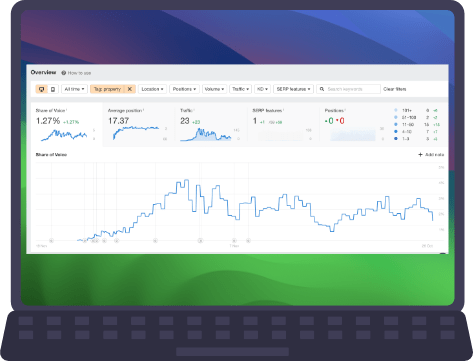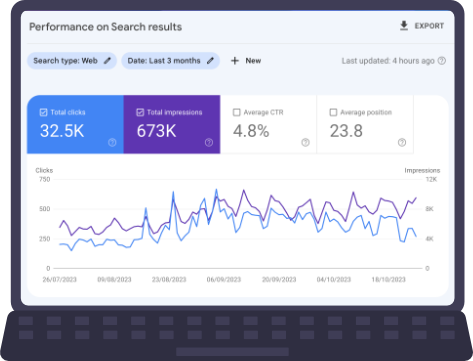
How to measure success with SEO
Just as ships rely on lighthouses to safely guide them to the shore, a website with successful SEO serves as a beacon, guiding potential customers through the vast sea of the internet.
In the dynamic, evolving world of digital marketing, measuring the success of your SEO (Search Engine Optimisation) strategy is paramount. Whether you’re a small business or an international corporation, understanding the effectiveness of your SEO efforts is pivotal in improving your online visibility, driving organic traffic, and boosting conversions.
At our local SEO agency, we want to help you understand the importance and significance of good SEO by guiding you through the process of measuring your SEO strategy’s success, providing you with the knowledge and tools to effectively evaluate your performance and make data-driven decisions for future optimisation.
Understanding SEO Metrics
Before diving into the measurement of your SEO strategy’s success, it’s crucial to understand what SEO metrics are and why they hold such importance in any SEO audit. SEO metrics are quantifiable measures used to track and analyse the performance of your website in search engine rankings. They provide valuable insights into various aspects of your SEO strategy, such as the quality of your content, the user experience on your site, and the effectiveness of your keywords. Think of it like a game of Tetris. The higher your score (and the fewer obstacles in your way), the better you’re doing. SEO metrics are significant because they allow us to understand how well a website is doing.
However, SEO metrics are not just numbers; they are the beating heart of your online presence. These metrics tell you what’s working, what’s not, and where there is room for improvement. Similarly, you can also identify trends, make necessary adjustments, and gauge the overall health of your SEO strategy.


Key Metrics to Measure SEO Success
When it comes to measuring the success of your SEO strategy, there are several key metrics that you should be focusing on. These metrics provide a comprehensive view of your SEO performance and can guide your optimisation efforts.
- Organic Traffic: This is the number of visitors who land on your website through unpaid search results. A steady increase in organic traffic is usually a good sign that your SEO efforts are paying off.
- Bounce Rate: This is the percentage of visitors who leave your website after viewing only one page. A high bounce rate might indicate that your site’s content is not engaging enough or that the user experience is poor. That said, it is important to review the bounce rate on a page-by-page basis, depending on the role of the page; for example, a conversion page should have a high bounce rate.
- Conversion Rate: This is the percentage of visitors who complete a desired action on your site, such as making a purchase, filling out a form, or subscribing to a newsletter. A high conversion rate is a strong indicator of successful SEO and effective website design.
- Keyword Rankings: This refers to the position of your website in search engine results for specific keywords. If you’re a local SEO agency in Warwickshire, for example, you’d want to rank high for keywords like “SEO Warwickshire” or “local SEO agency.” Improving keyword rankings can lead to increased visibility and traffic.
- Page Load Time: This is the amount of time it takes for your website pages to load. Slow page load times can negatively impact your SEO, as search engines prioritise sites that provide a better user experience.
- Backlinks: These are links from other websites that point to your site. High-quality backlinks can improve your site’s authority and credibility, which can boost your search engine rankings.
- Click-Through Rate (CTR): This is the percentage of people who click on your website after it appears in search results. A high CTR often indicates compelling content or effective meta descriptions.
By regularly monitoring these key metrics, you can gain a deep understanding of your SEO performance, identify areas for improvement, and make informed decisions to enhance your SEO strategy.
How to Conduct an SEO Audit
An SEO audit is a comprehensive process that evaluates how search engine-friendly your website is in multiple areas. It is an essential part of any SEO strategy, as it provides insight into a website’s performance and highlights any areas for improvement.
At AlphaQuad, we live and breathe SEO, and it really isn’t as intimidating as it sounds. Here, we have provided a step-by-step guide on how an SEO audit is conducted:
- Crawl Your Website: The first step in an SEO audit is to crawl your website using tools like Google’s Search Console or third-party tools like Screaming Frog. This will give you a bird’s eye view of your site’s structure and identify any technical issues that might be hindering your SEO performance.
- Check for Meta Title and Descriptions: Each page on your website should have a unique meta title and description that accurately describes the page’s content. These elements are crucial for SEO as they help search engines understand what your page is about and can influence click-through rates.
- Analyse Your Keywords: Evaluate the keywords you’re currently ranking for and identify any opportunities for improvement. Consider the relevance, search volume, and competitiveness of each keyword. If you’re a local SEO agency in Cardiff, for example, you’d want to rank for relevant Cardiff-centric keywords.
- Evaluate Your Content: Assess the quality and relevance of your content. It should be original, valuable to your audience, and optimised for search engines and users. Check for proper use of headers, keyword density, and readability.
- Check for Broken Links: Broken links can harm your SEO and provide a poor user experience. Use tools to identify and fix any broken links on your website.
- Assess Your Backlinks: Analyse your backlink profile to ensure you have high-quality, relevant backlinks. Poor quality or spammy backlinks can negatively impact your SEO.
- Review Your Site’s Speed: Page load speed is a crucial SEO factor. Use tools like Google’s PageSpeed Insights to check your site’s speed and get recommendations for improvement.
- Check Mobile-Friendliness: Having a mobile-friendly website is essential. Use Google’s Mobile-Friendly Test tool to check if your site is optimised for mobile users.
- Analyse User Experience: User experience is a critical ranking factor. Analyse your site’s navigation, design, and overall usability. A good user experience can lead to lower bounce rates and higher conversion rates.
SEO audits really are the bread and butter of a website’s success. By conducting regular SEO audits, you can stay on top of your SEO game, identify any potential issues before they become significant problems, and continuously improve your SEO strategy. If you haven’t got the time or resources to carry this out, our SEO audit services may be useful.

Using SEO Tools for Measurement
When measuring SEO success, utilising available tools and resources is of significant help and assistance. Tools provide valuable insights, automate complex processes, and help you track the success of your SEO strategy. Here are some SEO tools that can assist in measuring your SEO success:
- Google Analytics: This is a comprehensive tool that provides insights into your website’s traffic, user behaviour, and a variety of other important metrics.
- Google Search Console: This tool helps you understand how Google views your site, allowing you to optimise your site’s performance in search results.
- SEMrush: This is a versatile tool that offers features for keyword research, competitor analysis, backlink audits, and more.
- Moz Pro: This tool provides a suite of SEO tools, including keyword research, SEO audit and crawl, backlink analysis, and rank tracking.
- Ahrefs: Known for its backlink analysis, Ahrefs also offers tools for keyword research, competitor analysis, and rank tracking.
- Screaming Frog: This is a website crawler that helps you improve onsite SEO by extracting data and auditing common SEO issues.
- PageSpeed Insights: This tool by Google analyses the content of a web page and then generates suggestions to make that page faster.
Remember, these tools are designed to help you reach your SEO targets, and the key to effective use of these tools is not just in the collection of data but in the interpretation and application of that data to improve your SEO strategy.
Common Mistakes in Measuring SEO Success
While measuring SEO success is crucial, it’s also easy to make mistakes that can skew your understanding of your SEO performance. Here are some common mistakes to avoid:
- Focusing Solely on Rankings: While keyword rankings are essential, they are not the only measure of SEO success. It’s also important to consider other metrics like organic traffic, bounce rate, and conversion rate.
- Ignoring Local SEO: If you’re a local business, it’s crucial to focus on local SEO metrics, such as local search rankings and Google My Business insights.
- Not Considering User Experience: SEO is not just about pleasing search engines. It’s also about providing a great user experience. Factors like page load speed, mobile-friendliness, and site usability can significantly impact your SEO.
- Not Setting Specific Goals: Without specific, measurable, achievable, relevant, and time-bound (SMART) goals, it’s challenging to measure success. Make sure you have clear SEO goals in place.
- Not Conducting Regular SEO Audits: SEO is not a set-it-and-forget-it strategy. Regular SEO audits are crucial to identify issues and opportunities for improvement.
By avoiding these common mistakes, you can ensure a more accurate and effective measurement of your SEO success.

Overall
Measuring the success of your SEO strategy is a critical aspect of digital marketing. It provides valuable insights into your website’s performance, highlights areas for improvement, and guides your future optimisation efforts. Understanding and applying these principles can significantly enhance online visibility and drive business growth.
Remember, SEO is not a one-time task but an ongoing process. Regular audits, continuous monitoring of key metrics, and consistent adjustments to your strategy are essential for sustained success. With the right tools, a clear understanding of SEO metrics, and a commitment to continuous improvement, you can effectively measure and enhance your SEO strategy’s success.


